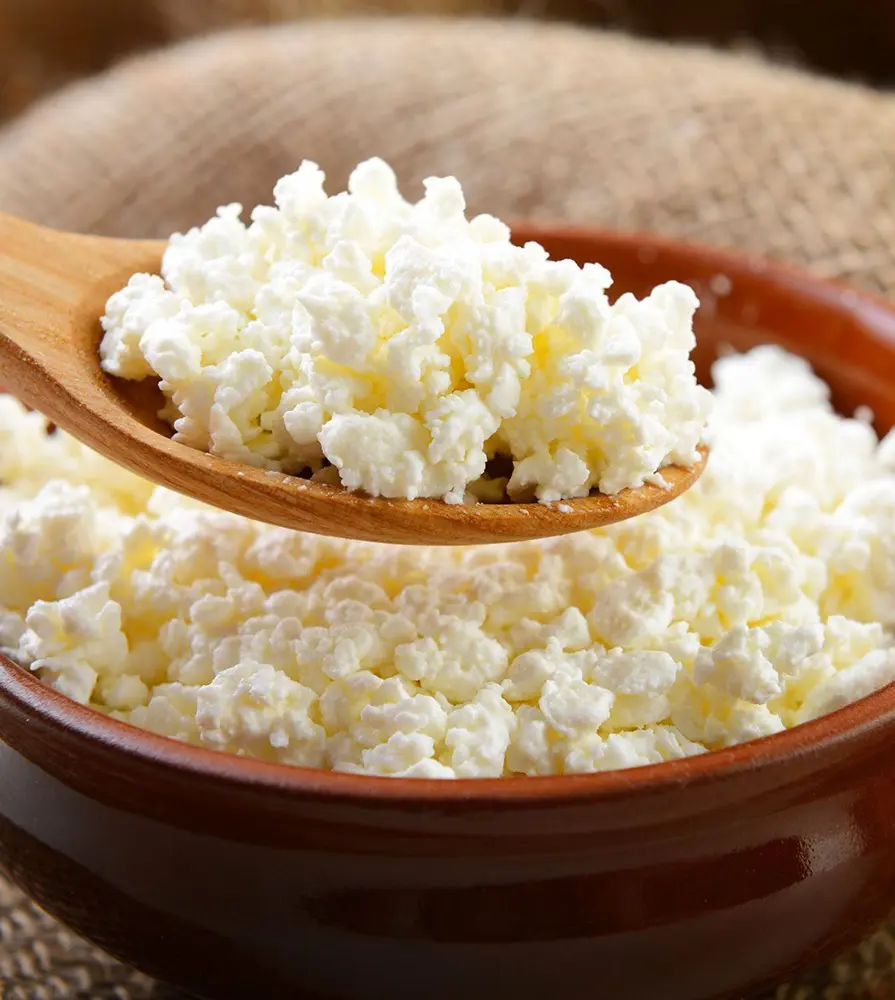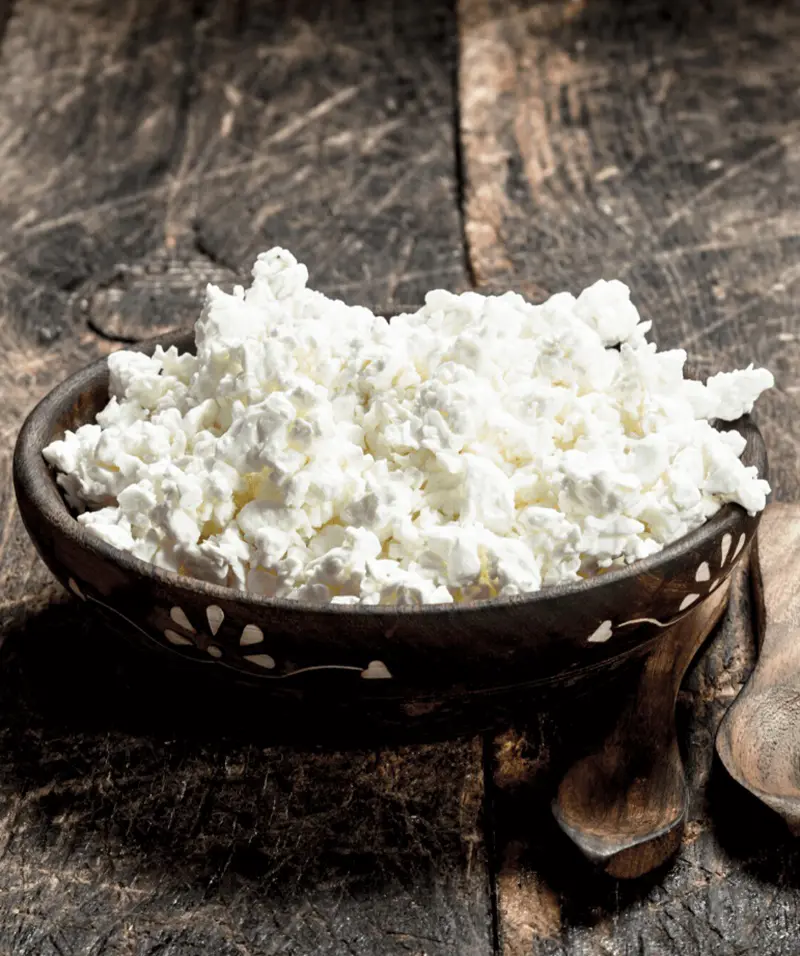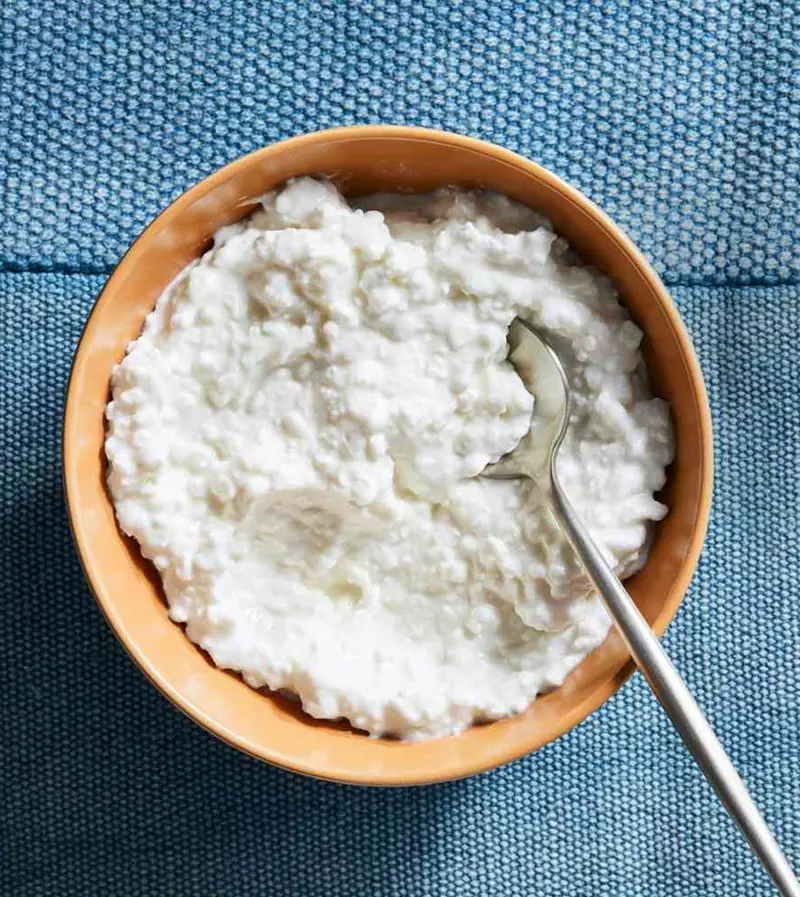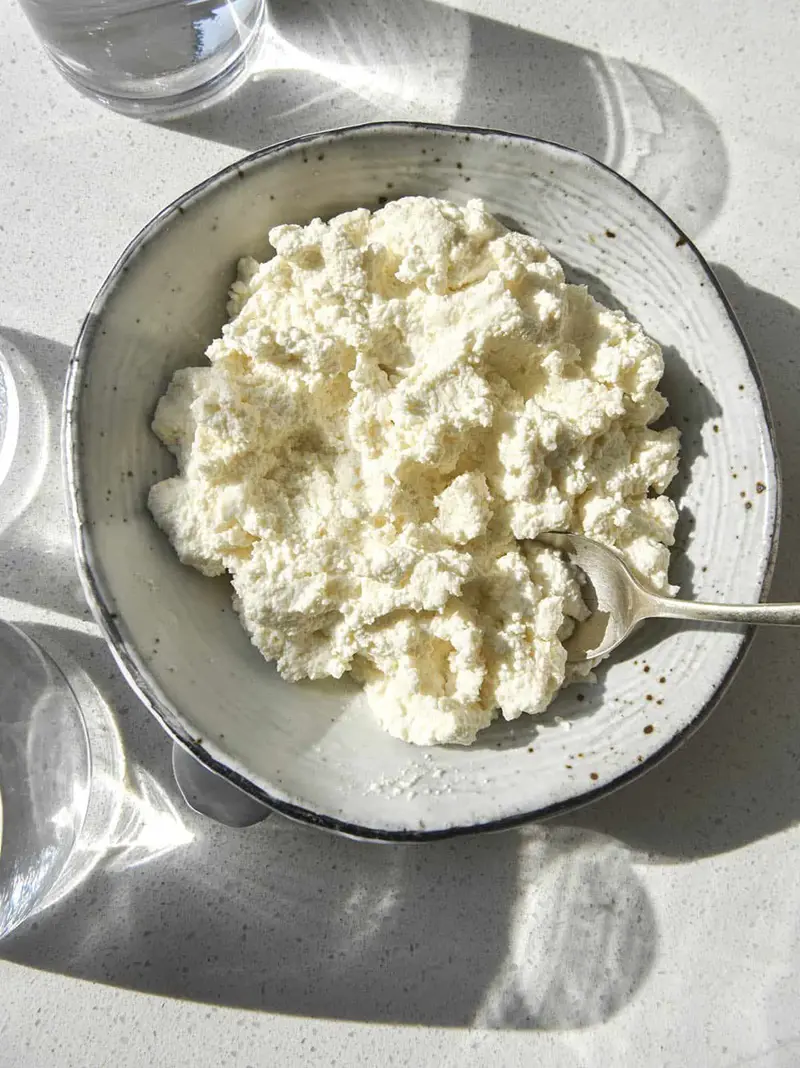Cottage Cheese Nutrition And Health Benefits

This post may contain affiliate links. If you make a purchase through links on our site, we may earn a commission.
One of the most popular dairy products known for its creamy texture and tangy flavor, cottage cheese has been a staple in many diets for centuries. Not only is it delicious, but it also offers a wide range of nutritional benefits supporting a healthy lifestyle.
Packed with protein, vitamins, and minerals, this versatile cheese can be a valuable addition to any meal plan. In this article, we will explore the various health benefits of cottage cheese and how it can contribute to overall well-being.
What Is Cottage Cheese?

This tangy dairy product is a type of cheese freshly made from the curds of pasteurized milk. It is a soft, creamy cheese with a slightly grainy texture due to the curds not being pressed together during production.
It is also known for its high protein content and is often favored by those looking to add more protein to their diets. Additionally, it comes in different varieties, such as full-fat, low-fat, and fat-free, to cater to different dietary preferences.
Nutrition Facts Of Cottage Cheese

The nutrition facts of cottage cheese can vary slightly depending on the brand and type. A half-cup (113 grams) serving of low-fat (1% milk fat) cottage cheese provides the following nutrients:
- Calories: 81
- Protein: 14 grams
- Carbs: 3 grams
- Fat: 1 grams
- Vitamin B12: 29% of the Daily Value (DV)
- Sodium: 20% of the DV
- Selenium: 19% of the DV
- Riboflavin: 15% of the DV
- Phosphorus: 13% of the DV
- Calcium: 5% of the DV
- Folate: 4% of the DV
Carbohydrates
Cottage cheese is relatively low in carbohydrates compared to its protein and fat content. The carbohydrates in cottage cheese primarily come from lactose, the natural sugar found in milk.
However, because cottage cheese is made by separating the curds from the whey during the cheese-making process, some lactose is removed along with the whey. This results in a lower carbohydrate content than dairy products like milk or yogurt.
Fats In Cottage Cheese
Full-fat cottage cheese contains saturated fat, a type of fat that is solid at room temperature. While excessive consumption of saturated fat may contribute to heart disease, moderate intake as part of a balanced diet is generally considered acceptable.
It also contains unsaturated fats, including monounsaturated and polyunsaturated fats. These fats are considered heart-healthy and may help improve cholesterol levels when consumed in moderation.
Protein

This type of cheese is valued for its high protein content, making it a popular choice among individuals looking to increase their protein intake. The actual protein content can vary slightly depending on factors such as the type and brand of cottage cheese.
Protein is essential for various bodily functions, including muscle repair and growth, immune function, and hormone production. Including cottage cheese in your diet can help you meet your daily protein needs, especially for those who follow vegetarian or low-meat diets.
Vitamins and Minerals
Cottage cheese is an excellent source of calcium, an essential mineral for strong bones and teeth. A single serving of cottage cheese can provide up to 20% of the recommended daily calcium intake. It also contains phosphorus, which works with calcium to maintain healthy bones.
In addition to calcium and phosphorus, it is a good source of other essential minerals such as magnesium, potassium, and zinc. These minerals are crucial for many bodily functions, including muscle and nerve function, energy metabolism, and immune system health.
Calories In Cottage Cheese
The calorie content of cottage cheese can vary depending on the brand, type, and serving size.
Typically, a serving size of one-half cup of low-fat cottage cheese contains around 80-100 calories, while a serving size of one-half cup of full-fat cottage cheese can contain around 120-140 calories. It is always a good idea to check the nutrition label of the specific brand you're purchasing to get an accurate calorie count.
Health Benefits Of Cottage Cheese

Cottage cheese is typically made through a relatively simple process that involves curdling milk and separating the curds from the whey.
It offers a range of health benefits, making it a popular choice for those seeking to improve their overall well-being. Here are some of the key health benefits associated with cottage cheese consumption:
May Aid Weight Management
This cheese is relatively low in calories compared to other protein-rich foods. This means that individuals can enjoy a satisfying portion of cottage cheese without consuming excessive calories, making it a suitable choice for those looking to manage their weight or reduce calorie intake.
The protein and fat content in cottage cheese can help slow down the digestion process, leading to a gradual release of energy and prolonged feelings of fullness. This can help prevent overeating and snacking between meals, contributing to better weight management.
Supports Muscle Growth And Recovery
Cottage cheese also contains casein, a slow-digesting protein that can help keep the body in an anabolic state for longer periods. This makes cottage cheese an ideal food for those looking to support muscle growth and recovery, particularly when consumed before bed.
Casein protein is also known to reduce muscle breakdown which is especially beneficial during periods of intense physical activity or training. By consuming cottage cheese regularly, individuals can help support their muscle-building goals and improve their overall athletic performance.
Promotes Gut Health
The nutrients found in cottage cheese, including protein and calcium, support the integrity of the gut barrier. A healthy gut barrier helps prevent the entry of harmful substances into the bloodstream, reducing the risk of inflammation and promoting overall gut health.
Consuming cottage cheese as part of a balanced diet may help reduce the risk of certain digestive disorders, including inflammatory bowel diseases (IBD) such as Crohn's disease and ulcerative colitis. The nutrients and probiotics in cottage cheese support a healthy gut environment which can help prevent inflammation and maintain gastrointestinal health.
Blood Sugar Management
Like most dairy products, cottage cheese also contains potassium, a mineral that helps regulate blood pressure. High blood pressure is a risk factor for cardiovascular disease, which is closely linked to diabetes. By including potassium-rich foods like cottage cheese in their diet, individuals can help maintain healthy blood pressure levels and reduce their risk of diabetes-related complications.
Reducing calorie intake and promoting weight management, can indirectly support better blood sugar control, as excess body weight is a risk factor for insulin resistance and type 2 diabetes.
Improves Skin Health
Cottage cheese is a rich source of protein which is essential for tissue repair and regeneration. Skin is primarily made up of protein, and adequate protein intake supports the repair of damaged skin cells, helping to maintain healthy skin texture and elasticity.
It has a high water content which helps keep the skin hydrated and supple. Proper hydration is essential for maintaining skin elasticity, preventing dryness and flakiness, and reducing the appearance of wrinkles and fine lines.
Types Of Cottage Cheese

Cottage cheese comes in several different types which primarily differ in their fat content. Here are some common types of cottage cheese:
- Full-fat Cottage Cheese: This type of cottage cheese contains the highest fat content (4.3g per 100g serving) among all varieties. It typically has a creamy texture and rich flavor due to the higher fat content.
- Low-fat Cottage Cheese: It has had some of the fat removed to reduce its overall fat content (0.3g per 100g serving). It still retains a creamy texture but may have a slightly less rich flavor compared to full-fat cottage cheese.
- Skim Cottage Cheese: It has had all of the fat removed during processing limiting fat content to about 0.3g per 100g serving. It has a leaner texture and may taste slightly less creamy than full-fat or low-fat varieties.
- Creamed Cottage Cheese: It is a variation that includes the addition of cream which enhances its creaminess and richness. It typically has a higher fat content than regular cottage cheese.
- Small Curd vs. Large Curd: It is also classified based on the size of its curds. Small-curd cottage cheese has smaller, finer curds, while large-curd cottage cheese has larger, more noticeable curds. The choice between small and large curd is often a matter of personal preference.
- Lactose-free Varieties: Some brands offer organic cottage cheese made from milk sourced from organically raised cows. Additionally, there are lactose-free versions available for individuals with lactose intolerance.
Potential Risks Of Cottage Cheese

This dairy product is generally considered safe for most people when consumed as a balanced diet. However, there are some potential risks associated with cottage cheese consumption:
Lactose Intolerance: Cottage cheese is a dairy product and contains lactose, a type of sugar found in milk. Individuals who are lactose intolerant may experience digestive discomfort, such as bloating, gas, and diarrhea, after consuming.
Allergies: Some individuals may be allergic to milk proteins present in cottage cheese, particularly casein and whey. Allergic reactions can vary in severity and may include symptoms like hives, swelling, difficulty breathing, and anaphylaxis in severe cases.
High Sodium Content: Some varieties of cottage cheese may contain added salt to enhance flavor. Consuming cottage cheese with high sodium content regularly can contribute to high blood pressure and increase the risk of heart disease.
Bacterial Contamination: Like other dairy products, cottage cheese can be susceptible to bacterial contamination if not handled and stored properly. Consumption of contaminated cheese can lead to foodborne illnesses, such as listeriosis or salmonellosis, which may cause symptoms like fever, nausea, vomiting, and diarrhea.
Recent posts
Nutrition
Nutrition
Liquorice Root: Benefits And Uses
You can spell it liquorice or licorice; this herb or root has been in use for centuries in most medicinal applications, as a natural sweetener and to enhance flavors. Regarding its origins, it comes from the root of the "Glycyrrhiza galbre" plant and...
Nutrition
Is Ramen Healthy? Here's What Dietician Says
Ramen is a traditional dish from Japan that in the recent era has become a global phenomenon. This beloved and comforting soupy dish however has been questioned, when it comes to its nutrition. Best for those looking for a quick (instant), affo...
Nutrition
Is Wheat Bread Healthy? An Expert Picks
Wheat bread has been proudly celebrated as a dietary staple in countless homes for as long as people can remember. It has earned a reputation as a healthier alternative to white or any other processed bread, that no one can deny. Because of its evide...
Nutrition
Is Sausages Healthy? Nutrition And Health Benefits
Sausages are tasty in an addictive way, making them one of the most popular foods worldwide. You may have enjoyed this convenient food often, whether on a bun with mustard or grilled on a barbecue, the simple preparation methods are what makes its co...
Nutrition
Ice Cream Benefits: Nutrition, Potential Risks And Best Choices
Not gonna lie, ice cream is often taken as a guilty pleasure treat, a delightful treat that takes you to cloud nine but is frequently associated with negative health implications. Nonetheless, the happy news is when devoured mindfully, ice cream can ...
Nutrition
Is Sushi Healthy? Some Good and Bad Choices
Sushi is a wholesome meal and a beloved Japanese dish. The traditional sushi recipe is a simple combination of fresh fish, vegetables, and vinegared rice which is popular for its minimalistic preparation. As with any food, there are factors that dete...







